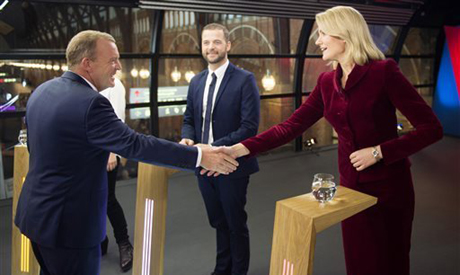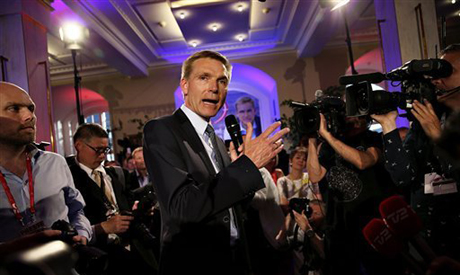Right-wing coalition expected to form a government, with pledges to restrict immigration and re-negotiate aspects of EU relationship

Lars Løkke Rasmussen, head of the Liberal Party, shakes hands with Prime Minister Helle Thorning-Schmidt, head of the Social Democrats, at the last TV debate before the election
On Friday, Denmark's first female prime minister handed her resignation to the Queen, having lost national elections the day before.
The centre-left coalition led by Helle Thorning-Schmidt lost the election to the right-wing coalition lead by Lars Løkke Rasmussen.
"Leadership is to step down at the right time. And that time is now," she told her supporters.
Thorning-Schmidt has also resigned as head of the Social Democratic Party.
Her opponent Rasmussen, who was also her predecessor as prime minister from 2009 to 2011, has offered to attempt to form a government, although what shape this government might take is still unclear.
For although the right-wing parties have amassed a total of 90 parliamentary seats, as opposed to the left-wing parties' 85, Rasmussen will have to go through difficult negotiations as his party, the Liberals, no longer represents the main force on the Danish right.
Unprecedented success for the far right
The main winners of yesterday's election are the far-right nationalist Danish People's Party (DF), who now become Denmark's second largest party for the first time in their history, second only to the Social Democrats who hold 37 seats in parliament and 21.1 percent of the popular vote.
DF is thus largely expected to start negotiating with the Liberals, but it is still unclear whether the anti-immigration and EU-sceptical far-right party is actually interested in joining a government. They have never done so in their 20-year history, choosing instead to support centre-right governments from the outside.
This strategy has worked to their advantage in many ways, giving them considerable influence over the government's policy despite not holding any ministerial office, while at the same time shielding them from direct criticism directed at the government.

Danish People's Party leader Kristian Thulesen Dahl reacts to the election results.
"What's more fun? To commit to a policy for the next four years and then be allowed to sit around and manage it, or to allow Lars Løkke Rasmussen to put a few people in ministerial cars who will be forced to ask us anytime they want to do anything? The latter sounds more tempting at first glance," Morten Messerschmidt, DF's faction leader in the European Parliament, told state broadcaster DR.
The party's leader, Kristian Thulesen Dahl, has been more cautious, stating that he was "counting on a good conversation" with Rasmussen during the negotiations, according to DR.
As such, the prospect of a minority government is not devastating for Denmark, a country with a long history of minority governments and consensus politics. This time around, however, many pundits believe that DF might have to take responsibility for their large electoral advance.
"To have such a large DF and a confident Liberal Alliance [a centre-right neoliberal party] standing outside of government would be a nightmare for Lars Løkke Rasmussen, who would be pressured from case to case," Danish daily Berlingske wrote Thursday night.
A challenge to immigration, and the EU
Regardless of what shape the government takes, some of its policies have already been spelled out. Immigration has been a major debate during the electoral campaign, and almost all political parties had pledged to place restrictions on immigration and asylum rights.
Thulesen Dahl vowed in his victory speech to roll back every easing of Danish asylum law made by the left-wing government, Danish newspaper Politiken reported, and the Liberals have made similar promises during the campaign.
Another key issue will be Denmark's relationship with the EU. A Danish right-wing government is largely expected to join the UK's David Cameron in demanding a renegotiation of EU treaties. Like him, the Danish right-wing parties want to restrict EU citizens' access to welfare allowances and, more generally, make sure that the EU doesn't become "a social union", as they described it in a joint declaration ahead of the election.
This radical change in Denmark's EU relations, a "dangerous experiment" for Politiken, is set to put the country on a growing list of voices calling for a thorough rethinking of the EU and for limits on its integration. As well as the UK and Hungary, France's National Front has become a powerful proponent of such limitations, and DF's Finnish counterparts, the "True Finns", currently control the foreign ministry as part of a coalition government.
"With the Danish election in mind, the [European Commission] will have to take note of the fact that skepticism of the EU is not merely a British phenomenon," Politiken's EU editor-in-chief concludes.

No comments:
Post a Comment
Note: Only a member of this blog may post a comment.